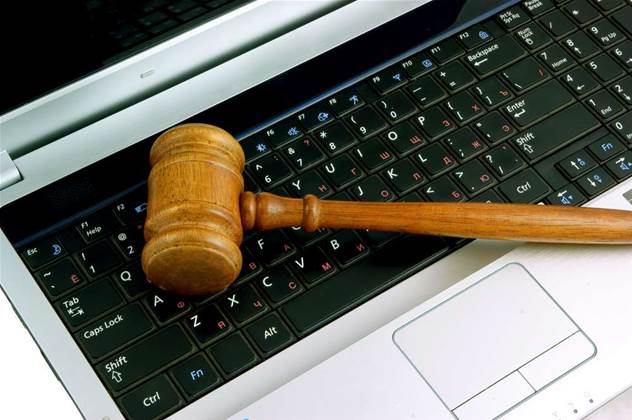Samsung has sued the Australian patent commissioner, and by extension the Federal Government, in an attempt to force a review of patents key to its ongoing, high-profile battle with smartphone rival Apple.

The South Korean manufacturer has battled Apple in Australian courts for nearly a year over attempts to block both companies' competing products from sale.
In the latest move, however, Samsung filed a statement of claim in the Federal Court on May 22 seeking a judicial review of four patents it claimed were inappropriately granted to Apple between 2009 and 2010.
The document, sighted by iTnews, claimed the patents were granted "ultra vires", or beyond the powers of the patent commissioner.
Samsung hoped the review would effectively nullify the patents, which sit at the core of Apple's case against Samsung's iPad rival tablet, the Galaxy Tab 10.1.
Court documents indicated that the patent commissioner will be represented in the new case by the Australian Government solicitor.
A directions hearing is scheduled for June 25 before Justice Annabelle Bennett, who has presided over the majority of hearings between Apple and Samsung in Australia to date.
Bennett also ordered the initial ban on the Samsung Galaxy Tab 10.1, which was later overturned by a full bench of judges.
Samsung said the four patents should not have been granted, as they were duplicates of innovation patents that had already been granted by the commissioner under Australia's patent system.
The patents are:
- 2006330724 - Unlocking a device by performing gestures on an unlock image (Granted April 1, 2010)
- 2007283771 - Portable electronic device for photo management (Granted May 20, 2010)
- 2008201540 - List scrolling and document translation, scaling, and rotation on a touch-screen display (Granted February 11, 2010)
- 2009200366 - List scrolling and document translation, scaling, and rotation on a touch screen display (Granted July 23, 2009)
The patents appear to be relatively new additions to the case, as they were not raised in initial hearings between Apple and Samsung.
Apple had accused Samsung of infringing up to ten patents, and at times only three patents, in the Galaxy Tab 10.1 during the initial hearings last year.
It will allege, however, that Samsung infringed a total of 258 claims and 22 patents in final hearings, set to be heard between July and October, according to court documents totalling at more than 300 pages.
Of the 22 patents, 12 have been brought up in other jurisdictions.
Mark Summerfield, patent lawyer and senior associate with Watermark, said the case against the patent commissioner would likely be heard and settled quickly, ahead of the final hearings a month later.
He noted Apple's strategy in filing for innovation patents ahead of standard patents was quite common and defendable by existing case law, as long as the duplication was proven to be a mistake by the commissioner.
The patent office typically grants innovation patents much more quickly than standard patents, the latter of which have a longer lifespan.
However, Summerfield said Samsung's claims were the first he had seen of an attempt to gain court-mandated changes to a patent decision by the commissioner.
"Technically, the patents should not have been granted, so there is a legitimate case for review," Summerfield said.
"On the other hand, the consequences for Apple are fairly harsh ... I think the court will consider itself to have considerable discretion in determining what the legislative intent was in a case like this."
Summerfield said the court may ultimately cancel the patents which would "eliminate all of the broadest claims" in the new case, likely an ultimate goal for Samsung.
A spokeswoman for Samsung said the application had been made separately from the main case for legal procedural reasons.
"Although the application has been filed separately, it is, for all intents and purposes, part of the existing proceeding between Apple and Samsung," they said.
US battles heat up
Separately, legal battles between Samsung and Apple in the US have continued to heat up after court-mandated mediation between the chief executives of both companies failed to produce a settlement.
Apple this week filed for a US injunction against the launch of Samsung's latest smartphone, the Galaxy S III, ahead of its planned launch on June 21. It hoped to put a dent in the nine million reported pre-orders of the phone, labelled by some as a clear threat to the iPhone.
"Apple has been able to obtain the Galaxy S III sold in the United Kingdom and determined that this device clearly infringes at least two of the Apple patents at issue [in the primary case]," the company said in its filing.
It sought the injunction based on two Apple-owned patents, covering the ability to use a single search function for multiple data searches – such as that used in Siri – and 'data tapping' functions.
A Samsung spokesman said the launch would go ahead in the US despite the injunction request.
"Samsung believes Apple's request is without merit. We will vigorously oppose the request," they said.
Apple has also continued to seek a more permanent ban on the Galaxy 10.1 line of tablets but has faced delays in getting an order from the presiding US judge, Lucy Koh.
Last month, a court of appeals told Koh to reconsider Apple's request regarding the tablet.
In a brief order on Monday, Koh denied Apple's motion to ban the phone again on procedural grounds, saying the appeals court must formally cede jurisdiction back to her before she could consider it.
Once that happens, Apple could refile its request, Koh said, without specifying when the appeals court would relinquish jurisdiction.
"Each day that Samsung continues to sell its infringing Tab 10.1 causes additional harm to Apple through design dilution, lost sales, lost market share, and lost future sales of tag-along products," Apple said in a court filing last month.
With Reuters



.png&h=140&w=231&c=1&s=0)



_page-0001.jpg&w=100&c=1&s=0)


.png&w=120&c=1&s=0) Security Exhibition & Conference 2025
Security Exhibition & Conference 2025
 Integrate Expo 2025
Integrate Expo 2025
 Digital As Usual Cybersecurity Roadshow: Brisbane edition
Digital As Usual Cybersecurity Roadshow: Brisbane edition
 iTnews Benchmark Security Awards 2025
iTnews Benchmark Security Awards 2025











.jpg&h=140&w=231&c=1&s=0)



